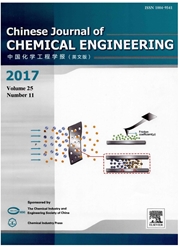

 中文摘要:
中文摘要:
A new route towards phenol production by one-step selective hydroxylation of benzene with hydrogen peroxide over ultrafine titanium silicalites-1(TS-1) in a submerged ceramic membrane reactor was developed, which can maintain the in situ removal of ultrafine catalyst particles from the reaction slurry and keep the process continuous.The effects of key operating parameters on the benzene conversion and phenol selectivity, as well as the membrane filtration resistance were examined by single factor experiments. A continuous reaction process was carried out under the obtained optimum operation conditions. Results showed that the system can be continuously and stably operated over 20 h, and the benzene conversion and phenol selectivity kept at about 4% and 91%, respectively. The ceramic membrane exhibits excellent thermal and chemical stability in the continuous reaction process.
 英文摘要:
英文摘要:
A new route towards phenol production by one-step selective hydroxylation of benzene with hydrogen peroxide over ultrafine titanium silicalites-1(TS-1) in a submerged ceramic membrane reactor was developed, which can maintain the in situ removal of ultrafine catalyst particles from the reaction slurry and keep the process continuous.The effects of key operating parameters on the benzene conversion and phenol selectivity, as well as the membrane filtration resistance were examined by single factor experiments. A continuous reaction process was carried out under the obtained optimum operation conditions. Results showed that the system can be continuously and stably operated over 20 h, and the benzene conversion and phenol selectivity kept at about 4% and 91%, respectively. The ceramic membrane exhibits excellent thermal and chemical stability in the continuous reaction process.
 同期刊论文项目
同期刊论文项目
 同项目期刊论文
同项目期刊论文
 Synthesis of Pd@ZIF-8 via an assembly method: Influence of the molar ratios of Pd/Zn2+ and 2-methyli
Synthesis of Pd@ZIF-8 via an assembly method: Influence of the molar ratios of Pd/Zn2+ and 2-methyli Preparation and Characterization of SiC Whisker-Reinforced SiC Porous Ceramics for Hot Gas Filtratio
Preparation and Characterization of SiC Whisker-Reinforced SiC Porous Ceramics for Hot Gas Filtratio Enhanced Catalytic Properties of Palladium Nanoparticles Deposited on a Silanized Ceramic Membrane S
Enhanced Catalytic Properties of Palladium Nanoparticles Deposited on a Silanized Ceramic Membrane S Fabrication of ceramic membranes with controllable surface roughness and their applications in oil/w
Fabrication of ceramic membranes with controllable surface roughness and their applications in oil/w Application of ceramic membranes in the treatment of oilfield-produced water: Effects of polyacrylam
Application of ceramic membranes in the treatment of oilfield-produced water: Effects of polyacrylam Insights into membrane fouling of a side-stream ceramic membrane reactor for phenol hydroxylation ov
Insights into membrane fouling of a side-stream ceramic membrane reactor for phenol hydroxylation ov Catalytic activity of palladium nanoparticles immobilized on an Amino-functionalized ceramic membran
Catalytic activity of palladium nanoparticles immobilized on an Amino-functionalized ceramic membran One-stepContinuous Phenol Synthesis Technology vi a Selective Hydroxylation of Benzeneover Ultrafine
One-stepContinuous Phenol Synthesis Technology vi a Selective Hydroxylation of Benzeneover Ultrafine Cleaning ceramic membranes used in treating desizing wastewater with a complex-surfactant SDBS-assis
Cleaning ceramic membranes used in treating desizing wastewater with a complex-surfactant SDBS-assis Enhanced catalytic properties of Pd nanoparticles by their deposition on ZnO-coated ceramic membrane
Enhanced catalytic properties of Pd nanoparticles by their deposition on ZnO-coated ceramic membrane One-step semi-continuous cyclohexanone production via hydrogenation of phenol in a submerged ceramic
One-step semi-continuous cyclohexanone production via hydrogenation of phenol in a submerged ceramic Palladium nanoparticles supported on a two-dimensional layered zeolitic imidazolate framework-L as a
Palladium nanoparticles supported on a two-dimensional layered zeolitic imidazolate framework-L as a Unusual Air Filters with Ultrahigh Efficiency and Antibacterial Functionality Enabled by ZnO Nanorod
Unusual Air Filters with Ultrahigh Efficiency and Antibacterial Functionality Enabled by ZnO Nanorod 期刊信息
期刊信息
